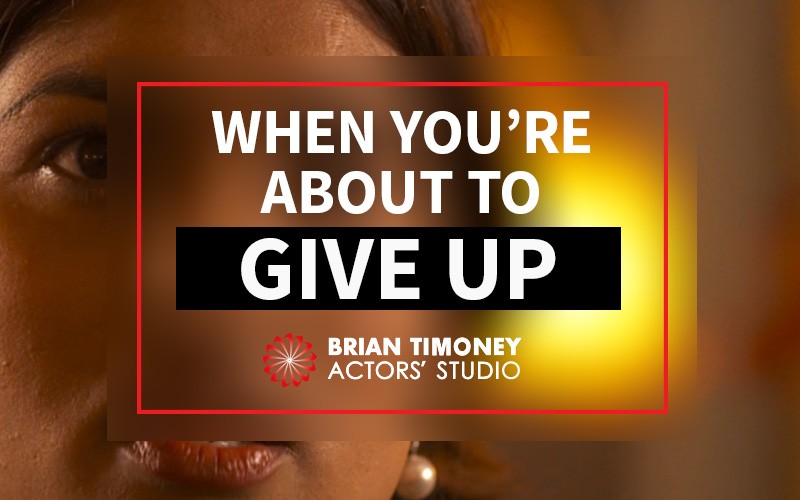From time to time I’m approached by old students or colleagues who gave up acting for a “normal” life. They will say to me:
I shouldn’t have given up. I often think about what would have happened if I had stuck with acting. I miss it.
That’s exactly it. To succeed an actor must love acting, and not celebrity; most people in the profession will never make Hollywood’s A-List. That’s probably one of the most important pieces of acting career advice anyone can give an aspiring actor. At the beginning of your career – or even in the middle of it – moments of self-doubt or months without work can drive even the most passionate actor to the brink of giving up.
You are not alone in feeling this way. Even those that made it all the way to the top of the industry have been there.
The Undiscovered
The two leads in Twilight, Kristen Stewart and Robert Pattinson, both nearly gave up a career in acting soon before landing a role in the box office-smashing franchise.
Stewart, having been “discovered” by an agent during a school play, spent years going to audition after audition without any panels seeing her potential. Of that low point, she says:
I decided a year after not getting any commercials, ‘F*ck it. I won’t make my mom drive around Los Angeles anymore
The lack of jobs wasn’t just making her feel bad for her mother. Huge seeds of self-doubt were ruining the acting process for her:
I also got so nervous for every single audition. I was just dying. I had one appointment left and my mom said, ‘Have a little integrity and go to your last one.’ And it was The Safety of Objects. If I hadn’t gotten that, I would have been done.
Her co-star, Brit Robert Pattinson, felt similar doubts about his status as an actor before Twilight:
If you say you’re an actor and you’re going to auditions and not getting parts, then you’re not an actor. I guess that’s what my predicament was
The Perfectionists
Some actors want to give up not because they can’t get a job, but because they won’t settle for anything other than the best. You might feel this way; that if you’re not perfect to you, or to others, then there is no point in being an actor.
Scottish superstar Ewan McGregor has admitted to feeling this way. In 1993 he nearly gave up his career after seeing Daniel Day-Lewis’ performance in Jim Sheridan’s In the Name of the Father.
Day-Lewis was so good in the film that McGregor felt there was nothing else he could contribute to the industry, and set fire to his Equity card. In fact, he still struggles with this feeling when he sees a Day-Lewis film.
Whenever I watch him, I think, ‘what’s the point? There’s no point in carrying on. That’s it.
Gemma Arterton, scene-stealing star of Byzantium and St Trinian’s, was unfortunate enough to nearly be bullied out of acting. At the beginning of her film career she struggled with her “commoner” accent, despite having the looks and skills of a star.
Directors and agents wore her down to the point where she had to choose between walking away from a career as an actor or taking voice lessons to master her natural working class accent. It was close, but she’s still acting today.
Imposter Syndrome
Imposter syndrome is a type of self-doubt that is found in nearly every walk of life, but especially so in acting. Widely celebrated actors from Don Cheadle through to Michelle Pfeiffer have admitted to feelings of being a “fraud,” or a “sham”. They feel like at any moment a director might realise they have no talent, and fire them.
If such obviously talented people feel that way, there is no shame in feeling imposter syndrome yourself.
When you feel like you don’t belong, ask yourself just one question:
– Do you trust the judgment of your director or your peers?
If the answer is yes, then you must believe them when they choose to work with you. They had options, and they chose you.
If the answer is no, then your doubt should really be pointed at their skills, not yours!
Nervousness:
Like Kristen Stewart, you might have problems with nervousness that are affecting your auditions. Although there are many guides to calming exercises out there, one of the most simple ways to conquer nerves is to use method acting.
Alison Pill describes how she instinctively taps into the method to cope with her nervousness:
I know that I am not a part of the scene since the character isn’t nervous. It’s a matter of aligning your own feelings with what the scene is about… if the character isn’t uncomfortable then I can’t be.
Lack of Motivation
At some point, you may want to give up acting because you feel you lack the motivation. It can be hard to tell whether this is a phase – maybe you’re bored with the same old audition circuit – or if you’ve really reached the end of your acting career.
One way to find out is to shake up your lifestyle without giving up acting. Maybe try auditioning in a new city, or take a class in an acting style that’s new to you. Many people find being surrounded by new styles and new people to be exactly what they need to feel motivated to act again.
As Mark Twain once said:
Twenty years from now you will be more disappointed by the things you didn’t do than by the ones you did do. So throw off the bowlines. Sail away from the safe harbour. Catch the trade winds in sails. Explore. Dream. Discover.
Throw caution to the winds before you give up – and if your passion bounces back then keep on trying.
If you’re ready to revitalise your acting career, why not look at the Ultimate Acting Programme?


